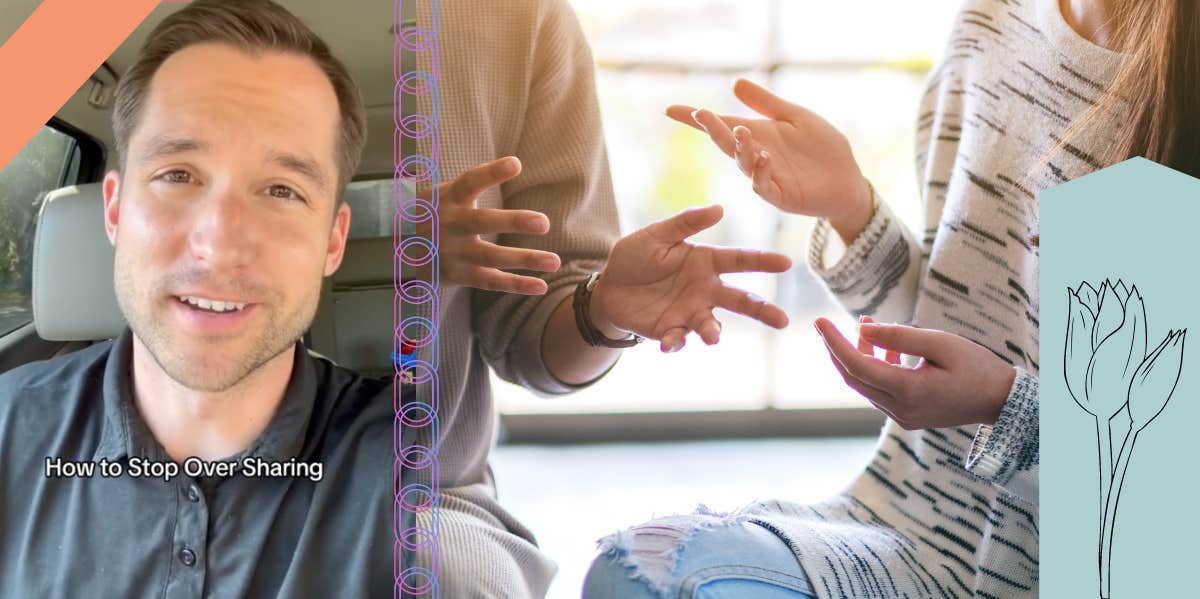6 Simple Ways To Stop Oversharing In Conversations
Revealing too much personal information isn't a good look.
 Farknot_Architect / Getty Images, Atiq via Canva and TikTok
Farknot_Architect / Getty Images, Atiq via Canva and TikTok In today's hyper-connected world, the impulse to share our thoughts, experiences, and emotions has become deeply ingrained within us. Social media platforms offer an enticing outlet where we can express ourselves, seek validation, and connect with others on a global scale.
However, the allure of constant self-disclosure often leads to oversharing, where personal boundaries dissolve and private details are exposed to a wide audience. From the workplace to relationships, oversharing can impact our lives in numerous ways.
What is oversharing?
Oversharing refers to the act of revealing an excessive amount of personal information, often beyond what is considered appropriate or necessary. It occurs when individuals share intimate details about their lives, thoughts, or experiences without considering the potential consequences.
Oversharing happens in several different ways and contexts. It can take place on social media platforms, in interpersonal conversations, and in professional settings. It blurs the line between public and private, often leading to negative impacts such as damaged relationships, compromised privacy, and potential harm to one's reputation.
So why do people do it? It can be for any reason, but the most common include:
- Desire for validation
- Emotional release
- Social media culture
- Lack of boundaries
- Attention-seeking
- Lack of social awareness
- Overestimation of trust
- Emotional vulnerability
Recognizing the need for balance and cultivating a sense of restraint is crucial in maintaining our privacy, protecting our relationships, and safeguarding our mental well-being. And stopping yourself from oversharing is a wonderful tool to have.
How to Stop Oversharing
TikToker and lawyer Jefferson Fisher has a few suggestions on how you can stop oversharing in your life and protect yourself. In his video, he breaks down the top ways to stop yourself from oversharing.
He begins by saying, "If you wouldn't share your personal closet with them, don't share your personal thoughts with them."
1. Add a ‘now’ filter to the question.
A "now" filter is a way to sense if the person needs to know the information right now. Fisher explains that you should ask the question: "But do they need to know it now?"
You may believe that this person needs to know this information, but does it have to be now? Fisher continues, "Most of the time the answer is no." So if you come to that conclusion, don't share the information. This will help you keep more of your personal thoughts to yourself.
2. Stop undervaluing the ‘price’ of your words.
A picture is worth a thousand words, right? But our words hold a price as well.
Fisher explains that people often undervalue the price of their words when they overshare: "Even when you answer that harmless question at work, 'How was your weekend?'"
Fisher states that this allows the other person to "create a perception of you for good or bad, and that comes at a very high cost." So remember that your words are worth something and take a pause before you use them.
3. Understand that true connection rarely comes from talking about yourself.
Fisher believes that you won't get a true connection if all you do is talk about yourself. He goes on to explain that if you ever think, "Am I talking too much?" the answer is almost always going to be yes.
So take a breath, take a beat, and listen to what other people have to say. This stops you from giving up personal information that could potentially be ammo for your enemies.
4. Establish boundaries and stick to them.
It may be cliché, but it works. Setting personal boundaries is crucial when it comes to sharing personal information. Take time to reflect on what you feel comfortable sharing with others and what you consider private. Define your limits and make a conscious effort to stick to them.
It's essential to remember that not everything needs to be shared with everyone. Learn to prioritize and be selective about the details you disclose to others, whether it's in person, through social media, or any other form of communication.
5. Review your social media settings.
Adjust the privacy settings on your social media platforms to ensure that only intended audiences can access your personal information. Regularly review and update these settings to maintain control over what you share online.
And if you do use your social media platforms to vent, rant, or sometimes safely overshare, use the closest friends tools. This allows you to choose trusted confidants to whom you can safely release your personal information.
Identify a select group of trusted individuals with whom you feel comfortable sharing personal details. These individuals are more likely to respect your boundaries and provide the support you need without judgment or negative consequences.
6. Practice self-awareness on the regular.
Developing self-awareness is key to understanding why you may be inclined to overshare. Reflect on your motivations and consider if you tend to overshare due to seeking validation, attention, or a desire to connect with others.
By understanding these underlying motivations, you can address them more effectively. Engage in self-reflection and mindfulness to recognize when you're oversharing or about to cross your personal boundaries. This awareness will empower you to make more conscious choices in sharing information.
Deauna Roane is an associate editor for YourTango who covers pop culture, lifestyle, astrology, and relationship topics. She's had bylines in Emerson College's literary magazine, Generic, and MSN.
